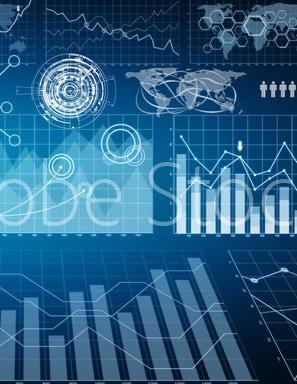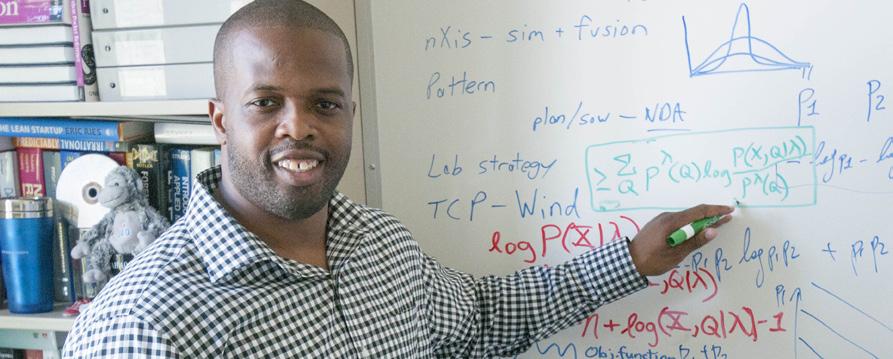
4 minute read
How Prepared are you for the Data Economy?
Colin Parris, Ph.D. Vice President for Software Research GE Global Research

Colin Parris ’85, Electrical Engineering, Howard University, is one of the greatest data economy evangelists on the planet.
One of his proudest accomplishments is his role in the Blue Gene Supercomputer business.
But long before supercomputer projects for highperformance system-on-a-chip architecture, Parris was an emerging leader in the world of digital convergence.
“When I first began at Howard, I was focused on electrical engineering, and then this thing called software suddenly showed up,” he recalled.
by Lango Deen ldeen@ccgmag.com
“People were always building processors and chips and electronic circuits to solve a problem, but software enables you to reconfigure the electronic circuit very quickly so that you can have the circuit do other things on top of a processor,” he explained.
Parris fell in love with software at Howard. His electrical engineering degree course not only introduced him to BASIC (Beginners’ All-purpose Symbolic Instruction) and Pascal, it gave him a ready network—students and professors—and taught him how to learn, which comes in handy considering the rate and pace at which Internet of Things (IoT) technologies he is involved in develop.
He also learned the difference between simply writing code and architecting code.
“If you’re just going to write code, yeah that’s interesting, but can you write effective code? Can you write code that’s secure? Can you write code that’s flexible?”
Federal funding of computer science education helps people understand how things work together and create the building blocks that change the world, Parris said.
“In the early days at Berkeley, the university became well known for BSD UNIX,” he said. “That operating system was created by AT&T, but it came out of a program at MIT funded by the U.S. government. They found Multics (Multiplexed Information and Computing Service), which became UNIX and then UNIX came to Berkeley and Bill Joy took that program and founded the Solaris operating system.”
Joy played an integral role in the early development of BSD UNIX while a graduate student at Berkeley. Today, nearly all operating systems are heavily influenced by Multics, through
HOW PREPARED ARE YOU FOR THE DATA ECONOMY?
UNIX, either directly (Linux, OS X) or indirectly (Microsoft Windows).
“Berkeley’s Arpanet turned to the Internet, and government seeded a lot of what we have in the computer age,” Parris said.
While Parris was completing his Ph.D. in electrical engineering, he helped convert an AT&T digital telephone switch from centralized call processing to distributed processing.
Later, at IBM, where he spent more than 20 years of his career, one of his first software development projects was electronic promotions for merchants to entice us to shop online and encourage us to come back—all via IBM servers. “The first wave of the internet was about connecting consumers,” he said. “Now we have more than 3 billion people connected on the Internet. By 2020, it will about 7 billion. When you look at the number of machines that will be connected by 2020, it’s roughly about 50 billion things.”
That staggering number of connected devices around the world becomes profound when you think the next sets of attacks are going to be attacks on infrastructure, he warned. “Massive attacks that could cripple financial, energy, and health systems that are all on the Internet because everything has been digitized,” Parris noted. “If we aren’t building the right systems and educating the next generation, who will take the lead?”
He asks us to imagine not just the worst-case scenarios of industrial machines—jet engines, power generators, pipelines, and locomotives—connected through the Internet, but to adopt a digital mindset that embraces what the Industrial Internet can offer in growth opportunities.
“To succeed and capitalize on the growth opportunities the Industrial Internet is creating, industrial companies must not only be deep in software and analytics but also have the physical knowledge to match,” Parris urged.
“It’s not enough to have great software. In the complex, high-tech infrastructure worlds, you must have the deep domain expertise and knowledge of the machines and business operating environments to match,” he said.
In the fall of 2014, GE appointed Parris vice president of software research. He leads software, systems, and analytics experts researching ways data can impact industry, placing him at the forefront of GE’s transformation into a Digital Industrial company through partnerships with GE’s businesses, partners, and clients. Parris’s blogs, talks, speeches and interviews have carried the same message since 2014: The data economy is here. S

For students, Parris has 4 TIPS for success in the data economy:
1. Develop a passion around learning. 2. Spend a couple of hours doing what you’re passionate about. 3. Join support groups; find communities that nurture your passion. 4. Build something.







